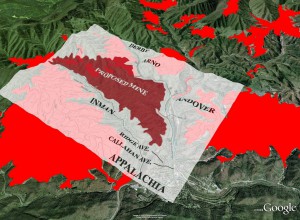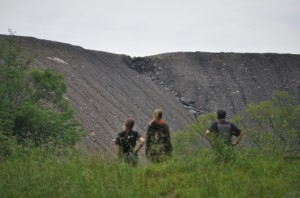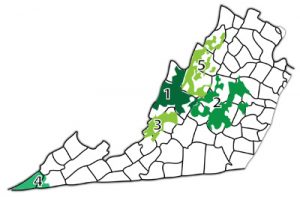By Melanie Foley
Legislative Policy and Research Assistant, Summer 2013
UPDATE: Both amendments proposed by Sen. Joe Manchin to the Water Resources Development Act did not make it into the bill. S.AMDT 846 and 850 would have prolonged the use of mountaintop removal by stripping the EPA’s authority to veto permits under the Clean Water Act while rolling back years of progress made to force coal operators to pay more for their pollution of Appalachia water. Thanks to everyone who called their senator yesterday and this morning for standing up for the right to clean water.
Call Your Senators Now!
The most recent assault in the “war on water” comes to us in the form of the EPA Fair Play Act (S.830). This bill is not fair play for Appalachian communities, as it would strip the Environmental Protection Agency of its ability to stop valley fill permits for mountaintop removal mines. The bill was introduced at the end of April by Senator Joe Manchin (D-WV). 
Just last month, the U.S. Court of Appeals upheld EPA’s authority to veto the Spruce Mine permit, saying that “The Congress made plain its intent to grant the [EPA] administrator authority to prohibit/deny/restrict/withdraw a specification at any time.” Sen. Manchin’s bill would nullify the court’s decision because it is retroactive back to 1972, meaning that mountaintop mining operations currently stayed by an EPA veto, including Spruce Mine, could move forward immediately.
Sen. Manchin’s first ever bill in the Senate attacked EPA permit veto authority, and as governor of West Virginia, he sued the EPA over the same issue.
The good news is that this bill, a model of destructive efficiency, is only one page long. As such, its pernicious intent has nowhere to hide, and is unlikely to pass on its own.
The bad news is that Sen. Manchin has hidden the same EPA attack in an amendment on a “must-pass” bill. He’s attempting to attach the bad amendment, S.AMDT 846, to the Water Resources Development Act (S.601), a large bill passed every two years to authorize necessary water projects such as harbor dredging and dam repair.
S.AMDT 846 is not the only threat to clean water found in this year’s WRDA. Sen. Manchin has attached another amendment, S.AMDT 850, the Clean Water Cooperative Federalism Act of 2013, known unofficially as the “Dirty Water Act.” This bill would gut the Clean Water Act by giving states, rather than the EPA, the ultimate decision-making authority over our nation’s water quality standards. We believe that water, unconstrained as it is by state boundaries, is the best argument for a federal approach. When this bill was introduced almost two years ago, President Obama threatened to veto it, and the bill never came to a vote.
Another bad amendment to WRDA is S.AMDT 809, Regulations From the Executive in Need of Scrutiny (REINS) Act. A pet project of Senator Rand Paul (R-KY), this bill would require congressional approval for any major new rules issued by executive agencies, including the EPA. This would allow just one chamber of Congress to block any regulation, environmental or otherwise.
If passed, these amendments would roll back years of progress toward stopping the wholesale destruction of Appalachian mountains, streams, and communities by mountaintop removal coal mining.
Tell your senators to oppose S.AMDT 846, S.AMDT 850, and S.AMDT 809.















